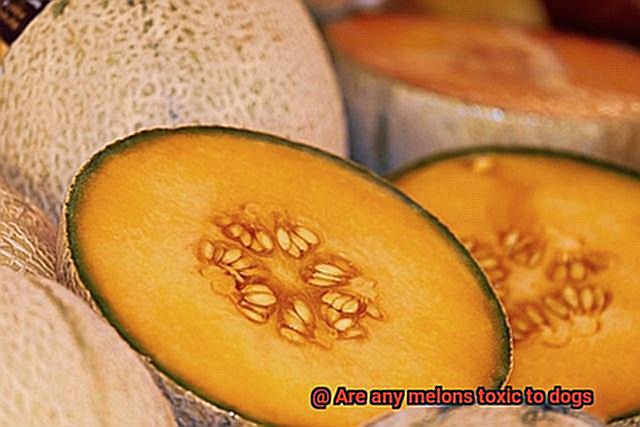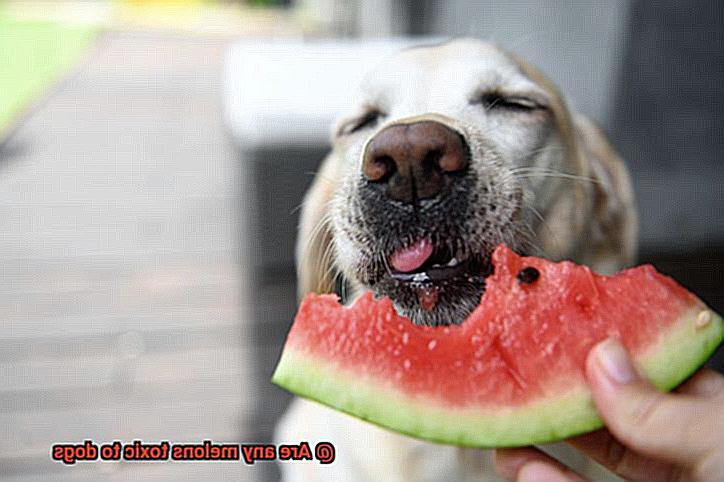Are any melons toxic to dogs?
Imagine a sunny summer day, with the sweet aroma of melons wafting through the air. As you savor a juicy slice, your furry companion gives you that irresistible “share with me” look. But hold up. Have you ever wondered if melons are safe for dogs?
Sure, melons can be a healthy addition to your pup’s diet, but not all melons are created equal when it comes to canine consumption. Yep, some melons can actually be toxic to our four-legged friends. But don’t worry, fellow dog lovers. Today, we’re delving into the world of melons to help you understand which ones are safe and which ones to avoid.
Join us on this fruity adventure as we uncover the truth about melon toxicity for dogs. From the classic watermelon to exotic cousins like honeydew and cantaloupe, we’ll give you all the essential info so you can make informed decisions about treating your pooch with these refreshing fruits.
So buckle up and get ready to explore the mysteries of melon safety for dogs because there’s nothing better than enjoying summer treats while keeping our furry buddies happy and healthy.
Benefits of Feeding Dogs Melons in Moderation
Contents
- 1 Benefits of Feeding Dogs Melons in Moderation
- 2 The Potential Risks of Feeding Toxic Melons to Dogs
- 3 What Types of Melons are Potentially Harmful to Dogs?
- 4 Exploring the Reasons Why Bitter and Horned Melons are Toxic
- 5 Recognizing the Symptoms of Eating Toxic Melons in Dogs
- 6 Understanding the Health Risks Associated with Consuming Toxic Melons
- 7 Tips for Avoiding Feeding Toxic Melons to Your Dog
- 8 Alternatives to Toxic Melons that are Safe for Dogs
- 9 Conclusion
When it comes to treating our furry friends, it’s important to find snacks that are not only delicious but also healthy. One such option that can be both refreshing and nutritious for French Bulldogs is melons. Whether it’s the juicy watermelon, the aromatic cantaloupe, or the succulent honeydew, feeding melons to your French Bulldog in moderation can offer a range of benefits.
The Nutritional Powerhouse
Melons are not just tasty; they are also packed with essential vitamins and minerals that can support your French Bulldog’s overall well-being. Here are some key nutrients found in melons:
- Vitamins A and C: Melons are rich in these vitamins, which are crucial for maintaining a strong immune system and promoting healthy skin and coat.
- Hydration Boost: With their high water content, melons can provide much-needed hydration to your furry friend, especially during hot summer months.
- Low-Calorie Treat: If your French Bulldog is watching their weight or prone to obesity, melons are an excellent choice due to their low-calorie and low-fat content.
Digestive Health and Energy Boost

Feeding melons to your French Bulldog can have additional benefits for their digestion and energy levels:
- Fiber-Filled Goodness: Melons contain high amounts of fiber, which aids in digestion and promotes regular bowel movements for a healthy digestive system.
- Quick Energy Fix: The natural sugars present in melons can give your active French Bulldog a quick energy boost without resorting to processed treats.
Antioxidants and Heart Health
Melons offer more than just hydration and vitamins; they also contain antioxidants and potassium:
- Potential Cancer Prevention: Studies suggest that the antioxidants found in melons may help reduce the risk of certain types of cancer in dogs.
- Heart-Healthy Potassium: Melons are a good source of potassium, which supports healthy heart function and muscle contractions.
Safety First
While melons are generally safe for dogs, there are a few precautions to keep in mind:
- Avoid Toxic Melons: Some melons, such as bitter melon and horned melon, can be toxic to dogs due to their high levels of cucurbitacin or other harmful substances. Always check with your veterinarian before introducing any new food into your French Bulldog’s diet.
- Seed and Rind Removal: Remember to remove the seeds and rinds from melons before feeding them to your pet, as they can pose a choking hazard or cause digestive issues.
The Potential Risks of Feeding Toxic Melons to Dogs
We all love spoiling our French Bulldogs with tasty treats, but it’s crucial to be aware of potential risks associated with certain foods. While melons are generally safe for our furry friends, there are some types that can be toxic to dogs. Let’s dive into the specific risks of feeding toxic melons to French Bulldogs and how we can keep them safe.
Types of Toxic Melons:
Certain melons, such as bitter melon, canary melon, and certain wild melons, contain toxic components that can harm our Frenchies. Bitter melon, for example, contains a substance called momordicin, which can cause digestive issues in dogs. Canary melon, on the other hand, has high sugar content that can lead to weight gain and diabetes in our adorable pups.
Potential Risks and Symptoms:
Feeding toxic melons to your French Bulldog can result in gastrointestinal upset. This may include vomiting and diarrhea, which can leave both you and your Frenchie feeling quite miserable. In more severe cases, ingestion of toxic melons can lead to liver damage or other organ issues. As responsible pet owners, it’s important to recognize the symptoms and take action promptly.
Precautions and Prevention:
To protect our French Bulldogs from the dangers of toxic melons, there are a few precautions we can take. First and foremost, keep these melons out of reach from our curious pups. Be cautious when walking your Frenchie around areas where wild melons grow, as they may be attracted to their scent and try to sample them. It’s also essential to educate ourselves on the appearance and characteristics of these toxic melons to minimize any accidental ingestion.
Immediate Actions if Ingestion Occurs:
If you suspect that your French Bulldog has ingested a toxic melon, don’t panic. Contact your veterinarian immediately and provide them with information on the type and amount of melon consumed. They will guide you on the necessary steps to ensure your Frenchie’s well-being. Remember, it’s always better to be safe than sorry.
What Types of Melons are Potentially Harmful to Dogs?
While most melons are safe for dogs to consume in moderation, there are a few types that can be potentially harmful. In this article, we’ll explore which melons to avoid and how to safely feed melons to your four-legged companion.
Watermelon: A Summer Favorite
Watermelon is a popular fruit during the hot summer months, but pet owners need to be cautious. While the juicy red flesh is safe for dogs, the seeds and rind can pose a choking hazard or cause digestive issues. Always remove the seeds and rind before offering watermelon to your dog.
Honeydew Melon: Sweet But Beware
Honeydew melons are known for their sweet taste, but they contain high levels of sugar. Feeding your dog too much honeydew can lead to weight gain and other health problems. Additionally, the high fiber content may cause digestive upset in some dogs. Moderation is key when offering honeydew melon as a treat.
Cantaloupe: A Refreshing Snack
Cantaloupe is generally safe for dogs, but precautions should still be taken. Remove the seeds and tough rind before serving cantaloupe to your pup to avoid choking hazards or digestive issues. Enjoyed in moderation, cantaloupe can provide your dog with hydration and beneficial nutrients.
Bitter Melon: Avoid at All Costs
Bitter melon should never be fed to dogs. It contains momordicin, a substance that can cause digestive upset and diarrhea in our furry friends. It’s best to steer clear of bitter melon entirely.
Other Considerations
While muskmelons and casaba melons are generally safe for dogs, it’s always a good idea to consult with your veterinarian before introducing any new foods into your dog’s diet. Additionally, even safe melons can cause stomach upset if consumed in large amounts. Feed melons as a treat or snack in moderation and monitor your dog’s reaction.
Exploring the Reasons Why Bitter and Horned Melons are Toxic
While most melons are perfectly fine for our furry friends to enjoy, there are a few exceptions that can be toxic to them. In this article, we will explore the reasons why bitter and horned melons are toxic to dogs.
Firstly, let’s talk about bitter melons. Scientifically known as Momordica charantia, bitter melons contain a substance called momorcharin, which is toxic to dogs. If a dog ingests bitter melon, it can cause gastrointestinal upset, including vomiting and diarrhea. So it’s best to keep these melons out of your dog’s reach.
Now onto horned melons, also known as kiwano melons. These funky-looking fruits contain cucurbitacin, a naturally occurring compound that gives them their bitter taste. While cucurbitacin is harmless to humans in small amounts, it can be highly toxic to dogs. If a dog consumes large quantities of horned melon, it can lead to severe symptoms like drooling, abdominal pain, and even organ failure.
It’s important to note that the toxicity of these melons is not limited to dogs. They can also be harmful to other animals and even humans if eaten in large amounts. So it’s best to be cautious and avoid feeding these specific melons to your furry friends.
If your dog accidentally ingests bitter or horned melon or shows any signs of toxicity, it’s crucial to seek veterinary attention immediately. A veterinarian may induce vomiting or administer activated charcoal to help prevent the absorption of the toxins.
Prevention is key when it comes to protecting our dogs from the potential toxicity of bitter and horned melons. Make sure to educate yourself about foods that can be harmful to dogs and keep them out of reach. And remember, always consult with a veterinarian before introducing any new food into your dog’s diet.
While bitter and horned melons may be off the menu for dogs, there are plenty of other melons that are safe for them to enjoy. Watermelon and cantaloupe are great options that can provide hydration and beneficial nutrients for your furry friend. Just remember to feed melons in moderation and remove any seeds or rinds before serving.
Recognizing the Symptoms of Eating Toxic Melons in Dogs
These adorable little pups with their big ears and squishy faces bring so much joy to our lives. But did you know that they can be quite sensitive when it comes to food? That’s right, my friends, our Frenchies can easily fall victim to the dangers of toxic melons. So, let’s arm ourselves with knowledge and learn how to recognize the symptoms of a toxic melon encounter.
- Vomiting and Diarrhea: Picture this – your Frenchie devours a slice of that sneaky bitter melon or takes a bite out of a treacherous horned melon. Within hours, you may notice your furry friend experiencing some serious tummy troubles. Keep an eye out for vomiting and diarrhea, as these are telltale signs that something isn’t quite right.
- Abdominal Pain: Just like us humans, dogs can experience abdominal discomfort when they’ve ingested something they shouldn’t have. If your Frenchie starts showing signs of discomfort such as whining or reluctance to move, it’s time to investigate further.
- Decreased Appetite: Ah, the French Bulldog’s love for food is legendary. But if your usually ravenous pup suddenly loses interest in their meals after a melon mishap, it could be a sign that something is amiss. Keep an eye on their eating habits and seek veterinary attention if their appetite doesn’t bounce back.
- Lethargy and Weakness: Our Frenchies are known for their playful and energetic nature. So, if you notice your pup becoming unusually lethargic or weak after munching on a suspicious melon, it’s time to take action. These symptoms could indicate a more severe reaction to the toxins present in the melon.
- Tremors and Seizures: In some cases, the toxic compounds found in certain melons can wreak havoc on a dog’s nervous system, causing tremors or even seizures. If you witness your Frenchie shaking uncontrollably or experiencing seizures, don’t hesitate – rush them to the vet immediately.
Now that we’re armed with knowledge, what’s next? Well, my friends, it’s time to take action. If you suspect your Frenchie has ingested a toxic melon, don’t waste a second. Contact your veterinarian right away and provide them with all the information they need to assist your furry friend effectively.
Treatment options for a dog that has eaten a toxic melon may include inducing vomiting to remove any remaining toxins from the stomach, administering activated charcoal to absorb the toxins, and providing intravenous fluids to maintain hydration. In severe cases, hospitalization may be necessary to closely monitor your Frenchie’s condition and provide intensive care.
Understanding the Health Risks Associated with Consuming Toxic Melons
Melons are a summertime delight for many of us, but did you know that some varieties can be toxic to our furry friends? As a French Bulldog owner, it’s important to be aware of the potential health risks associated with consuming toxic melons. While not all melons are harmful to dogs, certain types can pose a danger if consumed in large quantities.
Types of Toxic Melons:
- Bitter Melon: This tropical fruit is known for its bitter taste and is commonly used in Asian cuisine. However, it contains a substance called momordicin, which can cause gastrointestinal upset and even liver damage in dogs.
- Wild Cucumber: Often mistaken for edible cucumbers, wild cucumbers are highly toxic to dogs. They contain cucurbitacins, which can lead to severe gastrointestinal symptoms like vomiting and diarrhea.
Specific Toxins and Their Effects:
The toxins present in these melons can have various effects on a dog’s health. Momordicin, found in bitter melon, can cause inflammation in the gastrointestinal tract, leading to symptoms such as abdominal pain and decreased appetite. Cucurbitacins in wild cucumbers can irritate the digestive system and cause vomiting, diarrhea, and dehydration.
Symptoms of Toxic Melon Consumption:
If your French Bulldog has consumed a toxic melon, they may exhibit symptoms such as vomiting, diarrhea, abdominal pain, decreased appetite, lethargy, tremors, and in severe cases, seizures. It’s crucial to seek veterinary care immediately if you suspect your dog has ingested a toxic melon.
Treatment and Prevention:
Prompt treatment is essential to prevent further complications. Your veterinarian may induce vomiting or administer activated charcoal to help absorb any remaining toxins in your dog’s system. Intravenous fluids may be necessary to rehydrate your furry friend and flush out the toxins.
It’s important to note that while some melons may be safe for dogs to consume in moderation, it’s always best to consult with a veterinarian before introducing any new foods into their diet. Your vet can provide guidance on what types of fruits are safe for your French Bulldog and what quantities are appropriate.
Tips for Avoiding Feeding Toxic Melons to Your Dog
Melons are a juicy and refreshing fruit that many of us enjoy during the summer months, and it’s only natural to want to share this tasty treat with our furry friends. While most melons are safe for dogs to consume, there are a few exceptions that can be toxic and harmful. As a French Bulldog owner, it is important to be aware of the potential dangers and take steps to avoid feeding your pup any melons that could be harmful.
One melon that should be avoided when it comes to your French Bulldog’s diet is the bitter melon. This melon contains a compound called charantin, which can cause stomach upset, diarrhea, and vomiting in dogs. It’s best to steer clear of feeding bitter melon to your dog altogether to prevent any potential health issues.
Another melon that should be approached with caution is the horned melon, also known as kiwano. While not necessarily toxic, the horned melon can be difficult for dogs to digest due to its high fiber content. Feeding your French Bulldog too much horned melon can lead to gastrointestinal upset and even more serious health problems.
So, what can you do to ensure you’re avoiding feeding toxic melons to your French Bulldog?
First and foremost, educate yourself about the different types of melons that are toxic to dogs and familiarize yourself with their appearance and characteristics. This will help you easily identify and avoid them when purchasing or picking melons for your dog.
Always make sure to thoroughly wash and slice any melons before offering them to your French Bulldog. This will help remove any harmful substances or bacteria that might be present on the skin. Additionally, be sure to remove any seeds or rind that may be harmful or difficult for your dog to digest.
Stick to safe melons like watermelon or cantaloupe for your French Bulldog’s consumption. These melons are generally safe for dogs in moderation, but remember to remove the seeds and rind before feeding them to your pup.
If you suspect that your French Bulldog has ingested a toxic melon or is showing any symptoms of poisoning, such as vomiting or diarrhea, it is important to contact your veterinarian immediately. They will be able to provide the necessary guidance and treatment for your furry friend.
Alternatives to Toxic Melons that are Safe for Dogs
While certain melons can be toxic to dogs, there are plenty of alternatives that are not only safe but also packed with nutrients. In this blog post, we will explore the best melon options for your French Bulldog’s enjoyment.
Watermelon:
Watermelon is an excellent choice for your French Bulldog. Not only is it hydrating, but it is also rich in vitamins A and C, as well as lycopene, which acts as an antioxidant. To serve watermelon to your pup, remove the seeds and rind before offering them a juicy slice.
Cantaloupe:
Another safe melon option for your French Bulldog is cantaloupe. It is low in calories and contains essential nutrients like vitamin A and beta-carotene. Just like with watermelon, make sure to remove the seeds and rind before serving it to your furry friend.
Honeydew Melon:
Your French Bulldog will appreciate the sweet and refreshing taste of honeydew melon. It contains vitamins C and B6, as well as potassium. Remember to remove the seeds and rind before giving it to your pup.
Muskmelon and Persian Melon:
If you’re looking for melon varieties similar to cantaloupe, muskmelon, and Persian melon are great options. These melons offer similar nutritional benefits and can be enjoyed by your French Bulldog when the seeds and rind are removed.
Remember:
- Moderation is key when feeding melons to your French Bulldog. Treat them as occasional snacks or incorporate them into their regular diet in small amounts.
- Always consult with your veterinarian if you have any doubts about whether a specific type of melon is safe for your French Bulldog.
- Avoid giving your French Bulldog any melon with seeds or rind as they can cause digestive issues or blockages.
4_zNDFurAAI” >
Conclusion
In conclusion, it is essential for dog owners to be aware that certain melons can be toxic to their furry friends.
Watermelon, honeydew, and cantaloupe are generally safe and even beneficial for dogs in moderation. However, caution should be exercised with other melon varieties such as bitter melon or casaba melon, as they may contain substances that can harm dogs.
It’s always best to consult with your veterinarian before introducing any new foods into your pet’s diet.




